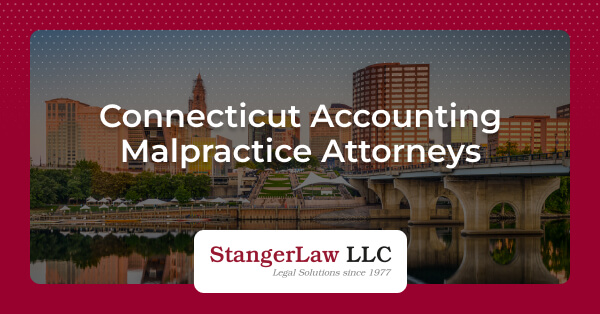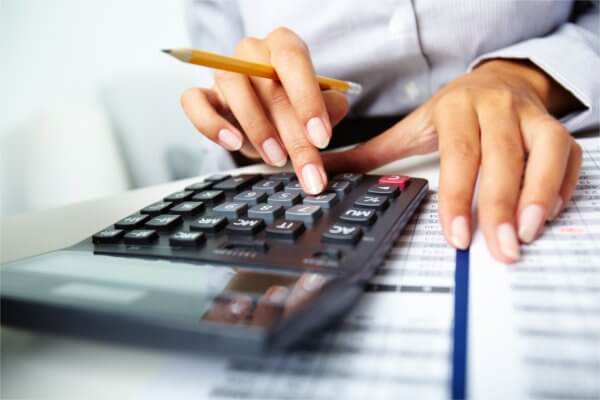
When you work with an accountant for your individual or business needs, you should be able to expect that your accountant will use their experience and knowledge to ensure that your financial needs are attended to properly.
No egregious mistakes should occur when you work with your accountant to keep business records or file your tax returns.
However, in some situations, an individual or business suffers because of an accountant’s mistakes.
Sometimes professional mistakes rise to the level of professional negligence, or accounting malpractice. In such cases, the injured party may be able to file a claim for compensation.
The Connecticut accounting malpractice lawyers at StangerLaw LLC represent parties injured by accounting malpractice and stand ready to speak with you about your case.
For immediate assistance from an experienced accounting malpractice lawyer in Connecticut, please call (860) 561-0651 or send an online message today.
Our Practice is Limited to Connecticut
We handle two types of accounting malpractice claims (6 figures+):
- Claims for penalties and interest caused by failure to pay taxes due to accountant or attorney malpractice (we do not seek recovery of unpaid taxes that were rightfully owed).
- Claims for taxes wrongly paid due to accountant negligence, but only if the deadline for filing an amended return has passed.
What is Accounting?
To understand the duties accountants owe to their clients, it is necessary first to understand what accounting involves.
According to an FAQ sheet from the American Institutes of CPAs (AICPA), accounting “deals with interpreting and communicating information about a company’s operations and finances.”
It is “extremely important to any company because the financial information, as interpreted by CPAs, allows executives to make informed business decisions . . . that help those companies become more successful.”
Accountants help to make sense of past business transactions and information, as well as to make “recommendations . . . for forecasting future events.”
Code of Professional Conduct for Certified Public Accountants
The AICPA Code of Professional Conduct requires that accountants behave in certain ways in relation to clients. It applies to members of the AICPA—who are licensed CPAs—in public practice, in business, and even those who are retired or unemployed. The Code requires member CPAs to carry out responsibilities in a manner that serves the public interest, and with integrity and due care. Even if an accountant is not a CPA or not a member of the AICPA, however, Connecticut negligence laws still apply.
Connecticut Malpractice Claims for Professionals
Connecticut law permits an injured party to file a malpractice claim if their accountant was negligent in their duties.
The case Mukon v. Gollnick defines professional malpractice as “the failure of one rendering professional services to exercise that degree of skill and learning commonly applied under all the circumstances in the community by a reasonable prudent member of the profession with the result of injury, loss, or damage to the recipient of those services.”
The court ruling in Stuart v. Freiberg clarifies that there are four elements to a professional malpractice claim in Connecticut:
- Accountant had a duty to adhere to a standard of conduct for the plaintiff’s protection, this could be as simple as establishing what a typical accountant would have done in the community;
- There are accountants who will testify as to the standard;
- Accountant failed to adhere to that standard;
- Plaintiff suffered an actual injury; and
- Accountant’s act (or omission) caused the plaintiff’s injury.
For a successful professional malpractice claim against an accountant, a plaintiff must prove that the harm the plaintiff has suffered resulted from the defendant’s breach of responsibility.
An experienced accounting malpractice attorney will engage expert witnesses who will explain how the accountant failed to offer a reasonable standard of care and how it was foreseeable that the plaintiff would suffer harm due to that failure. Proving that the damages relate to the accountant’s malpractice can be difficult, so seeking legal counsel for assistance is imperative.
Please contact a Connecticut accounting malpractice attorney at StangerLaw LLC for help navigating your claim’s complexities.
What Is Not Considered Accounting Malpractice in Connecticut?

Accounting malpractice is more than making an innocent mistake.
It is failing to provide adequate attention to the client’s accounting needs or making a misrepresentation that leads to monetary loss.
All errors an accountant makes do not amount to malpractice.
The following errors are unlikely to amount to accounting malpractice worth bringing:
- Errors that do not result in financial loss;
- Errors outside the accountant’s specified duties, as outlined in the engagement letter, unless the community standard is violated; and
- Bad outcomes, such as paying more taxes than expected. Provided your accountant acted in your best interests and followed professional standards.
If your accountant made one of these errors, they likely won’t be liable in an accountant malpractice claim.
It can be difficult for the average person to assess whether malpractice has occurred. An experienced accounting malpractice lawyer can help determine whether the accountant was negligent because the accountant failed to offer the level of professional care customary in the field.
What Compensation Is Available for Accountant Malpractice?
The remedy for a professional malpractice claim includes monetary damages.
A monetary award compensates the victim for the losses caused by the accountant’s negligence or malpractice.
The damages for accounting malpractice should restore you to where you would have been if not for the negligent behavior of the accountant.
A plaintiff that sues an accountant for professional negligence is entitled to recover all damages resulting from the accountant’s breach of duty.
The damages available depend on the circumstances of each case.
StangerLaw LLC’s Connecticut accounting malpractice lawyers can help you seek compensation for financial losses directly caused by your accountant’s malpractice.
Types of Claims Against Accountants in Connecticut
What kinds of accounting malpractice claims typically arise in cases where an accountant’s mistakes resulted in a plaintiff’s injury?
The following are examples of common accounting malpractice issues:
- Failure to discover employee theft;
- Providing erroneous or misleading advice regarding accounting matters;
- Faulty audits;
- Failure to detect fraud;
- Wrongful certification of financial statements;
- Failure to keep proper records;
- Failure to file proper tax returns;
- Errors on tax returns; and
- Fiduciary misconduct.
An accounting malpractice lawyer in Connecticut can help you determine whether you have legal recourse for an accounting malpractice claim.
What Is Connecticut’s Statute of Limitations for Accountant Malpractice?
The state law limiting the time to file a malpractice case falls under Connecticut’s general tort statute of limitations.
You have three years from the date of the alleged misconduct to initiate litigation for tort-based professional negligence claims. There are certain exceptions that extend this statute of limitations, but they are limited. If the malpractice claim is based on a breach of contract, it is governed by a six-year statute of limitations.
Given the limited time to file, you should act promptly if you believe you have an accountant malpractice case.
Please contact StangerLaw LLC for assistance. Our experienced accounting malpractice lawyer can help you navigate the procedural rules applicable to your particular case.
Contact an Experienced Connecticut Accounting Malpractice Attorney About Your Case
If you or your business has suffered significant losses as a result of a professional’s failure to follow the required standard of care for accountants, you need an experienced accounting malpractice lawyer to guide you in pursuing damages.
Victims of accounting malpractice may be able to file a claim by speaking with a Connecticut accounting malpractice attorney.
Don’t hesitate to contact us online or call (860) 561-0651 today to learn how we can assist you.